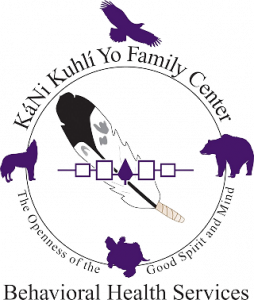Behavioral Health Services
988 Suicide & Crisis Lifeline
Mental Health America: Launched in July 2022, Mental Health America (MHA)’s work is to promote mental health as a critical part of overall wellness, including prevention services for all; early identification and intervention for those at risk; integrated care, services, and supports for those who need them; with recovery as the goal.
If you or someone you know is struggling or in crisis, help is available 24/7.
Call or text 988 or chat at 988lifeline.org. You can also reach Crisis Text Line by texting MHA to 741741.
Additional mental health options are available. Learn more about them in our Navigation Guide. We are here to help.
Triage Counseling
Triage Counseling is an assessment conducted at a client’s point of entry to health services which aims to categorize the urgency of mental health related problems. This involves the client receiving an initial screening evaluation and those classified as urgent (e.g., a danger to self or others, severe or psychotic symptoms) are given priority appointments.
Included in Triage Counseling are:
- Assessing the initial needs of the clients
- Scheduling initial intake appointments
- Providing back up for med management
- Completing suicidal assessments
- Meeting with clients in times of crisis when a therapist is not available
- Allowing for client walk-in services for a needs assessment
“Being able to speak directly with someone…immediately truly helped me through my current situation.
A calm empathetic person listening…Made it possible to make it until my appointment.”
– an OBH client
Therapy
“Emma definitely helps keep me going. I don’t know where I’d be without her. I feel safe talking to her.”
– an OBH client
At Oneida Behavioral Health, we aim to provide a safe and supportive space for individuals to manage stress, explore challenges, develop coping strategies and achieve self-growth. Our therapy services aim to help with issues that are hard to face alone. Through our services and resources, we hope to assist people in overcoming obstacles to their well-being.
Therapy has numerous positive benefits, including increasing compassion and self-esteem. Therapy can also help you develop coping strategies or emotional resilience to navigate mental health challenges. Learning and employing these crucial skills can make it easier to handle difficult situations, make healthy decisions and reach goals. Therapeutic journeys can help increase self-awareness and can contribute to self-growth. Therapy is also called psychotherapy, psychosocial therapy, talk therapy or counseling.
If you or a loved one could benefit from these services, Oneida Behavioral Health has a variety of therapy options to meet your needs. These include:
Individual Therapy: A trained professional helps an individual work through personal matters and obstacles they are facing. It is an effective treatment for a variety of life challenges, emotional difficulties and mental illnesses. Individual sessions are available for clients aged five (5) and older.
Couples Therapy: Designed with the goal of resolving relationship-based problems, couples therapy aims to improve and strengthen relationships through open and honest communication. It has the goal of building trust and understanding between spouses or significant others.
Family Therapy: Multiple family members can participate in this type of counseling, allowing the opportunity to resolve conflicts through open communication and navigate challenging times together.
Child Therapy: The health of a child and their family can be affected by emotional and mental health stress. Counseling can help families grow stronger together and children to grow into strong, healthy adults. Counseling can help a child and family learn:
- About their moods, feelings, thoughts and behaviors
- Good communication skills at home and at school
- How to work through problems and try new solutions in a safe space
- How to deal with trauma and address behavior challenges
Brainspotting:
“Where you look affects how you feel”
The brain is an incredible processing machine that digests and organizes everything we experience but trauma can overwhelm the brain’s processing capacity, leaving behind pieces of the trauma, frozen in an unprocessed state. Brainspotting (BSP) can minimize the influence of trauma, unpleasant emotions and uncover thinking patterns that are keeping a person stuck. Memories are not lost, but the “emotional charge” from the memory or the nonproductive thinking pattern will be cleared.
Those who have experienced either physical or emotional trauma, feel blocked in making progress in goals or performance, or challenged with faulty core beliefs may obtain benefit from BSP. This form of therapy has been shown to be an effective treatment option for those experiencing:
• All forms of trauma (& PTSD)
• Anxiety
• Attention issues (ADHD)
• Anger issues
• Phobias
• Substance abuse
• Chronic fatigue and chronic pain
• Impulse control issues
• Sports performance issues
• Eating disorders
The BSP trained clinician will ask you to choose an ‘issue’ that you would like relief from. While thinking about the issue, the clinician will ask you to share where in your body you feel the issue. You’ll be asked to rate the intensity of your feelings on a scale from 1-10. The clinician will lead you in an eye scan to find the position that seems to be strongly connected to this issue. After that, a rapid processing of memory, body responses, or verbal processing occurs, which results in the desired outcome– the issue gets resolved on a deeper level than talk therapy would allow.
Click here to watch a brief video about Brainspotting featuring David Grand, Ph.D.
“The comfort and ease of my appointment with Melissa was hands down perfect.”
– an OBH client
Gambling Assistance
 Compulsive gambling is a progressive disorder causing a psychologically uncontrollable preoccupation and urge to gamble. This results in excessive gambling, which can disrupt or damage personal, family and work relationships and endeavors. Compulsive gambling is recognized by the American Psychiatric Association as an impulse control disorder.
Compulsive gambling is a progressive disorder causing a psychologically uncontrollable preoccupation and urge to gamble. This results in excessive gambling, which can disrupt or damage personal, family and work relationships and endeavors. Compulsive gambling is recognized by the American Psychiatric Association as an impulse control disorder.
Are you a compulsive gambler?
Only you can decide whether or not you are a compulsive gambler. The disorder can impact people from all walks of life. The following questions can help you determine whether you may want to reach out for assistance:
– Have you ever lost time from work or family events due to gambling?
– Has gambling affected your reputation?
– Do you often gamble until your last dollar is gone or have you ever sold anything to finance gambling?
– Has gambling ever impacted your personal welfare or that of your family?
– Has gambling every disrupted your sleep?
– Do you use gambling to escape worry or trouble or to celebrate good fortune?
If you found yourself answering “yes” to more than a couple of these questions, you may want to reach out for help. Compulsive gambling can be as debilitating as an alcohol or drug addiction, but it can also be diagnosed and is a treatable disorder. It’s estimated that five to seven percent of Wisconsin residents are compulsive gamblers. You are not alone. If you believe you can benefit from gambling assistance, please reach out to Oneida Behavioral Health at 920.490.3790.
Tobacco Abuse
There’s a distinct difference between traditional tobacco and commercial tobacco. There are differences in the way the tobacco is planted, grown, harvested, prepared and used. Traditional tobacco has been used in sacred ways by Native Americans for centuries.
Commercial tobacco is produced by large companies for recreational use. It contains many chemical additives, many that are cancer causing when burned and can lead to disease and death. There is no safe level of exposure to commercial tobacco smoke, and damage from commercial tobacco smoke is immediate. That damage is not limited to only the person using the tobacco but to those exposed to second and thirdhand smoke as well, such as family members.
If you’re considering quitting commercial tobacco, Oneida Behavioral Health can help. Counseling or therapy can be a critical component to successfully overcoming dependence on commercial tobacco products. Oneida Behavioral Health can offer you resources to help restore balance in your life.
Alcohol Abuse Awareness
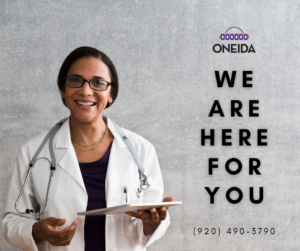
If you or a loved one is abusing alcohol, we are here to help. The clinical staff at Oneida Behavioral Services are ready to provide education, support, and treatment to clients who are affected by problem drinking. How can you tell if drinking is a problem? Start by asking yourself or your loved one the following questions:
- Have you ever felt you needed to cut down on your drinking?
- Have people annoyed you by criticizing your drinking?
- Have you ever felt guilty about drinking?
- Have you ever felt you needed a drink first thing in the morning (“eye-opener”) to steady your nerves or to get rid of a hangover?
Answering “yes” to two or more of the above questions may be a sign that alcohol use is a problem. The medical providers at Oneida Behavioral Health recommend that if you chose to drink, that it be in moderation. This means no more than 1-2 drinks per day for men and 1 drink a day for women. One drink can equal:
- 12 ounces of regular beer, which is usually about 5% alcohol
- 5 ounces of wine, which is typically about 12% alcohol
- 1.5 ounces of distilled spirits, which is about 40% alcohol
Individuals who are ages 21 and younger, pregnant women, and those who have health problems such as diabetes, heart disease and liver disease should avoid alcohol. Also, please talk with your doctor if you take prescription or over the counter medication, as it may be dangerous to combine them with alcohol. There is help and support available at Oneida Behavioral Health. Our team can provide the following services to our registered clients:
- Confidential assessments and screening
- Patient/family education
- Referrals to inpatient, detox and intensive outpatient treatment
- Individual or family counseling
- Information on AA meetings, Al-Anon meetings and other community supports
- Support for those who have a loved one who is using/abusing alcohol
- Individualized treatment planning
For more information on how Oneida Behavioral Health can help, call (920) 490-3790 or (920) 490-3860 and ask to speak with a Triage Counselor. We are here to help.
Psychological Evaluations
“The staff is always very friendly on the phone or in person
and your doctor’s are great as well.”
– an OBH client
OBH provides psychological evaluations, performed by a licensed psychologist, to diagnose a variety of mental health conditions or illnesses that impact memory, thought processes, and behaviors, such as anxiety, ADHD, bi-polar disorder, schizophrenia and other brain related health concerns. This includes:
- Psychological Evaluation: The evaluation is used to determine the severity of the symptoms, root causes, coping skills, reasons for aggressive behavior and other mental health conditions.
- Feedback Sessions: Following the evaluation, feedback sessions are used to discuss the findings from the evaluation and determine paths to improved mental health.
“Dr. Sayers was phenomenal. Kind, compassionate, thorough.
Did his job wonderfully while being personal and real. Would certainly recommend.”
– an OBH client
Psychiatry
At Oneida Behavioral Health (OBH), our psychiatrists play a vital role in the diagnosis, treatment and ongoing care of individuals facing mental health challenges, including mood disorders, anxiety, trauma and substance use disorders. Our psychiatry team is trained to assess both the emotional and physical aspects of various psychological conditions.
We provide comprehensive psychiatric evaluations for adults and children, including:
- Diagnostic Assessments: Our team conducts evaluations to understand concerns related to memory, thought processes and behavior. This helps identify conditions such as depression, anxiety, bipolar disorder, schizophrenia and substance use.
- Medication Management: Psychiatrists at OBH work with clients to determine the role medication plays in their treatment. They work closely to determine the right medication, monitor its effectiveness and adjust as needed.
- Collaborative Care: OBH prioritizes a holistic, integrated approach to treatment through open communication with psychiatrists, therapists, primary care providers or case managers.
Our team at Oneida Behavioral Health is here to offer expert guidance in a respectful and nonjudgmental environment. Whether you are reaching out for the first time or continuing your mental health journey, we are here to help you take the next step.
“Dr. Rodriguez was very professional and helpful… very good bed side manner… very respectful…” – an OBH client
Safe Care Pathway
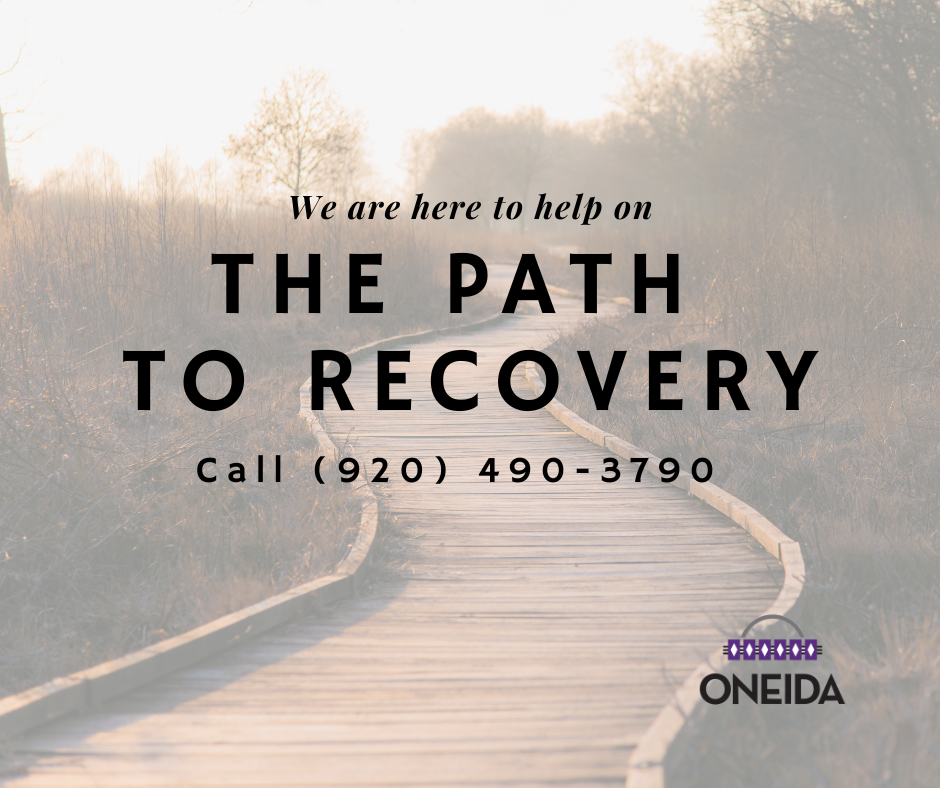 You Are Not Alone: Safe Care Pathway Helps Identify Those at Risk for Suicide
You Are Not Alone: Safe Care Pathway Helps Identify Those at Risk for Suicide
According to the U.S. Centers for Disease Control (CDC), during 2020, 12.2 million American adults seriously thought about suicide, 3.2 million adults made a plan and 1.2 million adults attempted suicide. During the same year, 45,979 people died by suicide in the U.S. Suicide rates were highest among non-Hispanic American Indian and Alaska Native persons.
That’s why at Oneida Behavioral Health (OBH), care providers view suicide prevention as an important part of treatment services for substance use disorders and mental health issues. Circumstances surrounding a substance use disorder or mental health challenge can lead to intense feelings of helplessness and hopelessness. These intense feelings, in turn, can contribute to increased substance use.
Through the Safe Care Pathway program at OBH, care providers work to identify individuals who may be at risk of suicide and create a customized safety plan to help the individual distance themselves from harmful thoughts. The program includes a variety of approaches, including the following:
Limiting access to weapons and other potentially lethal items. Limiting access to these items is not intended as a punishment, but rather as a means to reduce the opportunity for someone to harm themselves in moments of vulnerability.
Peer support. Support from those who are traveling a similar path is crucial for anyone struggling with addiction or mental health issues or who is at risk for suicide. Peer support helps a person understand that they are not alone and there are other people who can relate to their struggles and successes. Learn more about Oneida Behavioral Health’s weekday Wellness Support Group.
Frequent contact. With Safe Care Pathway, care providers have frequent contact with an individual, reaching out every three days or more to help the individual stick with his or her safety plan. While these contacts can have a truly positive impact, our work depends on those in challenging situations taking the first step and reaching out.
Reaching out for help when you experience unbearable pain is a sign of strength, not shame. You are not alone. We are here to listen when you or someone you love experiences despair, trauma, grief, depression or increased substance use. Safe Care Pathway is here to help. Call Oneida Behavioral Health today at (920) 490-3790.
“I love the services that are there to help and to know you are not alone.”
– an OBH client
Learn more about our Safe Care Pathway from Triage Counselor Keara Young
Social Work Services
Social workers help improve lives and communities by working with individuals, groups and families to address existing and prevent future challenges in their everyday lives. Oneida Behavioral Health offers youth and adult social work services and family support teams as an add-on service for existing clients. With details about your current circumstances, your primary therapist can complete a social work referral and submit it on your behalf.
Youth Social Work
Our providers work with children between 5 and 18 years of age providing: case management services, mental health check-ins, service coordination, connections to community and cultural activities, scheduled home and school visits, assistance with school needs, assistance with transportation (within reservation and as a last resort) and satellite offices in Seymour, OHS and Turtle. Social workers will also work in coordinated service teams for continuity in the plan of care.
Adult Social Work
Our providers also work with adults who are in need of social work services, either with or without substance use coordination needs. Social workers can assist with: long-term case management, resources for basic needs, referrals and services to meet client needs, navigating county programs, scheduled home visits and consultation with other providers regarding referrals.
Please talk to your Oneida Behavioral Health provider if you are interested in social work services.
Wellness Support Services
Triage Counselor Shelby Funseth Talks About the Wellness Support Group
“Please join us…”
Oneida Behavioral Health offers a Wellness Support Group on a weekly basis, Monday through Friday from 1:00 until 2:30 p.m. (excluding holidays). The goal of the group is to promote emotional wellness and wholeness in the self. The group is open to all Tribal eligible adults over the age of 18. No referral is needed.
Topics discussed include:
– Coping (Monday)
– Community, Support, Outreach (Tuesday)
– Relationships (Wednesday)
– Emotions (Thursday)
– Coping (Friday)
Please consider joining us to meet your immediate needs or concerns in a safe, supportive environment. Participants are welcome to attend as often as you like. We meet at Oneida Behavioral Health, 2640 West Point Road, Monday through Friday from 1:00 until 2:30 p.m. If you have questions or would like additional information, please call (920) 490-3790.
Substance Abuse Treatment (ATODA)
Our substance abuse treatment program takes a holistic approach to treating addiction. It addresses substance abuse disorder, co-occurring mental health conditions, and potential medical care needs. This includes:
- Alcohol, Tobacco and Other Drug Abuse (ATODA) assessments
- Same Day Substance Abuse Care (see below)
- Individual ATODA counseling
- Intensive outpatient group counseling
- Aftercare group counseling
- Educational groups
- Urine drug screens
- Providing services to adolescents through elderly
- Family groups
- Recovery coaching
- Referrals to residential treatment
- Medically Assisted Treatment (MAT)
- Hub and Spoke (integrated recovery support services)
“My provider is very understanding, has helped me achieve many goals, set new ones,
and my overall mental health has improved because of her.”
– an OBH client
Oneida Behavioral Health also offers Same Day Substance Abuse Care for those seeking treatment. Same day care is available without an appointment on a first come, first served basis Monday through Friday between 8:00 and 11:00 a.m. (you must be present by 10:00 a.m.). Find us as 2640 West Point Road in Green Bay. NARCAN® is available. Everyone deserves and can recover from substance abuse.
Same Day Substance Abuse Care
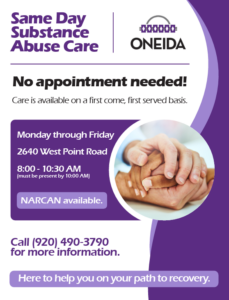 For those seeking treatment for substance abuse, Oneida Behavioral Health offers same day substance abuse care Monday through Friday between the hours of 8:00 a.m. and 11:00 a.m. (you must be present by 10:00 a.m.). Care is available on a first come, first served basis at 2640 West Point Road, Green Bay, WI 54304.
For those seeking treatment for substance abuse, Oneida Behavioral Health offers same day substance abuse care Monday through Friday between the hours of 8:00 a.m. and 11:00 a.m. (you must be present by 10:00 a.m.). Care is available on a first come, first served basis at 2640 West Point Road, Green Bay, WI 54304.
NARCAN® is also available. To learn more, please call (920) 490-3790. Everyone deserves to and can recover from substance abuse.
Co-Occurring Disorders
Co-Occurring Disorders, also known as dual diagnosis, refers to the presence of both a mental health condition and a substance use disorder. These conditions often interact in ways that can intensify symptoms, making integrated treatment an essential tool. Oneida Behavioral Health is here to provide services to clients experiencing a dual diagnosis.
Some of the most frequently seen combination include depression and alcohol use disorder, anxiety and stimulant misuse or PTSD and opioid dependence. Each individual’s experience is unique, and treatment is tailored accordingly.
Treating both conditions at the same time leads to better outcomes. Our team uses evidence-based approaches that address the emotional, psychological and physical aspects of both mental health and substance use challenges.
A path toward recovery is possible, and we are here to help you on your journey. With the right support, individuals with co-occurring disorders can achieve stability, improve their quality of life and build a future rooted in wellness and resilience.
Brainspotting
“Where you look affects how you feel”
The brain is an incredible processing machine that digests and organizes everything we experience but trauma can overwhelm the brain’s processing capacity, leaving behind pieces of the trauma, frozen in an unprocessed state. Brainspotting (BSP) can minimize the influence of trauma, unpleasant emotions and uncover thinking patterns that are keeping a person stuck. Memories are not lost, but the “emotional charge” from the memory or the nonproductive thinking pattern will be cleared.
Those who have experienced either physical or emotional trauma, feel blocked in making progress in goals or performance, or challenged with faulty core beliefs may obtain benefit from BSP. This form of therapy has been shown to be an effective treatment option for those experiencing:
• All forms of trauma (& PTSD)
• Anxiety
• Attention issues (ADHD)
• Anger issues
• Phobias
• Substance abuse
• Chronic fatigue and chronic pain
• Impulse control issues
• Sports performance issues
• Eating disorders
The BSP trained clinician will ask you to choose an ‘issue’ that you would like relief from. While thinking about the issue, the clinician will ask you to share where in your body you feel the issue. You’ll be asked to rate the intensity of your feelings on a scale from 1-10. The clinician will lead you in an eye scan to find the position that seems to be strongly connected to this issue. After that, a rapid processing of memory, body responses, or verbal processing occurs, which results in the desired outcome– the issue gets resolved on a deeper level than talk therapy would allow.
Click here to watch a brief video about Brainspotting featuring David Grand, Ph.D.
“Jamie is very kind and I feel very comfortable speaking to her. Thank you”
– an OBH client
Hub and Spoke - A Comprehensive Approach
Under the Hub and Spoke model, Oneida Behavioral Health serves as the lead, or “Hub” agency, in cooperation with contracted providers that serve as the “Spokes,” providing additional support.
This program is focused on Medicaid-eligible youth and adults with severe substance abuse disorders who are at high-risk for chronic physical and mental health issues. It is the Hub’s role to provide access to specialized substance abuse programs and support, including assessments, medication-assisted treatment and ensuring that a person’s overall behavioral needs are met. The Spokes then provide additional support services and care management following assessment and stabilization.
This model shows great promise of making a true difference in the lives of those dealing with substance abuse, because the approach offers a coordinated and comprehensive array of services including:
- Care Management – individuals are identified for treatment, followed by initial assessment and development of a personalized plan of care.
- Care Coordination – the plan of care is implemented through referrals, coordination and follow-up with all providers and treatment operations.
- Transitional Care – assures smooth movement of individuals from one treatment setting to another; between health care providers and between levels of care.
- Connections to Community and Social Support Services – connecting the individual to medical, behavioral, educational, community and social support services is vital to ongoing recovery efforts.
- Health Promotion – healthy behaviors are modeled and encouraged, including self-management of health, mental health and addiction issues.
- Individual and Family Support – a strong support network is needed and encouraged on the road to recovery.
For more information about Hub and Spoke, contact Oneida Behavioral Health at (920) 490-3790.
Program provides better access to mental health services (spectrumnews1.com)
Insights Group
The Insights Group is an 8-week education series on substance use and recovery. The Insights Education Group meets Tuesdays from 5:00 to 7:00 p.m.
Topics Include:
• Understanding Substance Use Disorders
• Stages of Change
• Consequences of Substance Use
• Addictive Thinking
• Relapse Prevention
• Physical Effects of Substances
• Post-Acute Withdrawals & Cross Addiction
• Recovery & Resources
This group may be recommended to you before going into Discovery Group if you have had no prior treatment. Or, your therapist may recommend Insights Group as an addition to individual therapy because the education would benefit you.
Transformations Group - DBT for Recovery
The Transformations Group is a 12-week psychoeducation group that will help you build skills to promote recovery and build a life worth living. This group meets Mondays between 9:30 and 11:30 a.m.
The goal of Dialectical Behavior Therapy (DBT) is to learn skills for changing unwanted behaviors, emotions, thoughts and events that cause misery and distress. We hope to help you improve your quality of life by helping you build the following skills:
Core Mindfulness.
Learning to stay in the moment, observe within and outside of oneself, and use Wise Mind to do what is best in a given moment.
Interpersonal Effectiveness.
Improving coping skills, building assertiveness skills, determining what is important in relationships, and how to increase the likelihood that your needs are met.
Emotion Regulation.
Learning to regulate ones feelings, name emotions, reduce impulsivity, and discover feelings through emotional growth.
Distress Tolerance.
Developing new skills to soothe oneself and increase ones ability to tolerate distress and crisis effectively, while also recognizing that stress is a part of life.
Transformations brochure
Transformations flyer
If you are interested in participating in this group, please talk to your primary therapist about a referral.
DBT Skills Group
Dialectical Behavior Therapy (DBT) is a type of talk therapy that emphasizes the importance of accepting the past while striving for an improved future. It helps individuals strike a balance between the two contradictory concepts of accepting yourself as you are and recognizing the need for change. DBT skills training can help individuals regulate emotions, build stronger relationships and reduce stress, leading to an increased sense of fulfillment.
Oneida Behavioral Health’s DBT Skills Group is a weekly two-hour group session in which you can learn DBT skills and how to apply them. It is led by two trained DBT facilitators/leaders and covers four modules: mindfulness, interpersonal effectiveness, emotion regulation and distress tolerance. The group takes place over 21 (or more) weeks and incorporates a cultural learning component each month.
If you are interested in being part of the DBT Skills Group, ask your therapist to provide a referral (participants must be receiving therapy at OBH). A DBT coach will then provide an orientation to the program. Expectations include attending weekly group sessions, completing weekly homework and additional coaching, if needed.
The Four Modules of DBT (21+ weeks):
- Mindfulness: This is the practice of being fully aware and focused in the present instead of worrying about the past or future.
- Interpersonal effectiveness: This means understanding how to ask for what you want and need, as well as setting boundaries while maintaining respect for yourself and others.
- Emotion regulation: This focuses on understanding, being more aware of and having more control over your emotions.
- Distress tolerance: This involves understanding and managing your emotions in difficult or stressful situations, without responding with harmful behaviors.
DBT Skills Group Times:
Morning DBT on Tuesdays from 9:00 until 11:00 a.m.
Afternoon DBT on Tuesdays from 2:30 until 4:30 p.m.
Listen as Dr. Marsha Linehan explains why learning DBT skills can help.
In this video, Dr. Marsha Linehan answers the question…Are DBT Skills for Everybody?
Discovery Group - Intensive Outpatient Therapy
The Discovery Group meets Tuesday, Wednesday and Thursday evenings from 3 p.m. to 6 p.m. Criteria to participate in the Discovery group includes:
- *Clients who are in Contemplation stage or higher.
- *Clients in Pre-Contemplation and have completed Aware/Reality Group.
- *Clients who have recently (within 6 months) completed inpatient treatment.
- *Clients will be informed that Discovery Group is a minimum of 18 sessions based on their progress.
*Clients are expected to complete a minimum of 4 support group options while in group, and Report Forms will be provided to include: where, when, what did you learn, etc.
The length of group time is individualized and based on:
- *Notable progress in Stage of Change.
- *Complete support group requirements.
- *Complete Circle of Life and Step 1 assignments.
- *Maintain abstinence during the vast majority of group.
- *Completed relapse prevention plan.
*Clients are expected to complete a minimum of 4 support group options while in group, and Report Forms will be provided to include: where, when, what did you learn, etc.
Journey Group - Aftercare Therapy
Aftercare therapy provides essential, ongoing support for those on the path to recovery. Clients must meet one of the bulleted criteria below to participate in Journey Group:
- Have successfully completed Discovery Group, and are in the Preparation/Action Stage of Change.
- Have recently completed (within past 6 months) an inpatient treatment program, and who are in the Preparation/Action Stage of Change. It is desirable that they complete at least 2 weeks of Discovery group before entering Journey Group.
Note: The client must have a completed relapse prevention plan prior to engaging in Journey Group. This may be completed with the primary counselor during the course of Discovery Group. A copy will be made for the Journey Group facilitators.
Participation in the Journey group will include the following:
- Client will be informed that Journey Group is a minimum of 16 sessions, based on client progress.
- They are expected to maintain sobriety during this time.
- 2 Family Days are mandated in order to complete this group.
- Clients will continue in support group options (minimum of 2 per week), and provide reports each week. (see below)
Support Group Options
OBH partners with a variety of area support groups that allows the client to participate in one that best fits them and their journey to recovery. These include:
- Sweat lodge, longhouse, Cultural Heritage, Wellness Group
- Mentor, outside support groups, workshops/seminars on issues related to wellness
- Church, church groups, bible study, Celebrate Recovery
- AA, NA, Al-Anon, HA, GA, Smart Recovery
Note: If clients identify other options, confirmation is needed from facilitators to identify appropriateness.
Recovery Coaching
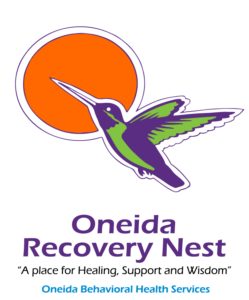 Recovery Coaches provide support and help participants establish a plan for life in recovery. The recoveree is responsible for directing their wants and desires including meeting their basic needs with meaning and purpose to work on goals with housing, employment and personal development. Peer Recovery Coaching assists recoverees in person, by phone and in the community setting before, during and after treatment services. A coach helps the recoveree by:
Recovery Coaches provide support and help participants establish a plan for life in recovery. The recoveree is responsible for directing their wants and desires including meeting their basic needs with meaning and purpose to work on goals with housing, employment and personal development. Peer Recovery Coaching assists recoverees in person, by phone and in the community setting before, during and after treatment services. A coach helps the recoveree by:
- Identifying recovery concerns
- Providing support tools needed to empower the individual
- Helping develop and expand on the recoveree’s strengths
- Establishing realistic goals focusing on the recoveree’s talents and skills
- Connecting them with support services to help them succeed in recovery
Please click here to learn more about the Recovery Coaches at Oneida Behavioral Health. Coaches are listed near the end of the second column.
Following are meetings/resources available at the Oneida Recovery Nest that can help you or your loved ones navigate a path to recovery:
- Nar-Anon for loved ones of addicts, Tuesdays:
5:30 p.m. newcomers welcome
6:00 – 7:00 p.m. meeting - Beading Circle Support, Tuesdays:
6:00 – 8:00 p.m.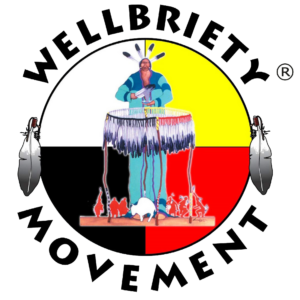 Located inside the kitchen-area (left door)
Located inside the kitchen-area (left door) - Native AA FIRESIDE meeting, Wednesdays:
6:00 p.m. meeting
Meeting will be held inside during inclement weather - Wellbriety Recovery Talking Circle, Thursdays:
6:00 p.m.
Located inside the Oneida Recovery Nest
The meetings listed above are held at the Oneida Recovery Nest, 1240 Packerland Drive #2 in Green Bay. For more information, please call: (920) 490-3950 or email RecoveryCoach@oneidanation.org.
What is Recovery Coaching
Oneida Recovery Nest
Recovery Nest Meetings and Activities
Nar-Anon Flyer
Wellbriety Flyer
Please click here for an extensive list of substance use resources.
Recovery Coach Training
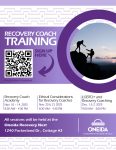 Recovery Coaches provide support and help participants establish a plan for life in recovery. The Recovery Coach Academy focuses on providing individuals with the skills needed to guide, mentor and support anyone who would like to enter into or sustain long-term recovery. Are you interested in becoming a Recovery Coach? View the flyer here. For additional information or questions please contact Hallie Volkman at hvolkman@heliosrecovery.com.
Recovery Coaches provide support and help participants establish a plan for life in recovery. The Recovery Coach Academy focuses on providing individuals with the skills needed to guide, mentor and support anyone who would like to enter into or sustain long-term recovery. Are you interested in becoming a Recovery Coach? View the flyer here. For additional information or questions please contact Hallie Volkman at hvolkman@heliosrecovery.com.
Visit this link to register for the upcoming trainings.
NARCAN® and Fentanyl Test Strips
To help prevent an opioid overdose, OBH has NARCAN® kits and fentanyl test strips available during it’s regular business hours of 8:00 a.m. to 4:30 p.m., Monday through Friday. Our office is located at:
2640 West Point Road
Green Bay, WI 54301
PH: (920) 490-3790
NARCAN®, also known as naloxone, is an opioid antagonist and is used to reverse the effects of an opioid overdose. It is usually given by a caregiver or loved one if they think an opioid overdose has occurred.
IMPORTANT: Administering NARCAN® is not a substitute for emergency medical care for opioid overdose. After NARCAN® has been given, you should immediately call 911 or your local emergency number. It’s also important to note, that NARCAN® will not counteract xylazine, which is not an opioid. Click here to view a Native Naloxone Training presentation.
Fentanyl test strips can help those using drugs detect the presence of fentanyl in different drug forms, such as pills, powder and injectables. It takes as little as two salt-sized grains of fentanyl to kill someone. Within minutes, someone using the test strips can know whether the drug they are about to take contains fentanyl. Instructions for using the test strips are available by clicking here.
Xylazine Test Strips Available
Xylazine test strips can be used to detect the presence of xylazine in various drugs including pills, powder and injectables. It is virtually indetectable otherwise, being that you can’t see it, taste it or even smell it. As little as 0.04 grams of Xylazine can become toxic to humans, and repeated use can lead to deadly necrotic skin wounds. With xylazine test strips, someone can know within minutes if the drug they are about to take contains xylazine.
Xylazine test strips are now available through Oneida Behavioral Health at (920) 490-3790. Instructions for using the test strips are available by clicking the link below.
What is Medication Assisted Treatment (MAT)
Medication Assisted Treatment (MAT) is an evidence-based treatment approach designed to support individuals working to overcome substance use disorders. MAT combines medication with counseling and behavioral therapies to address the complex needs of individuals, offering a comprehensive, holistic approach to recovery. It is recognized for its effectiveness in helping people achieve long-term sobriety, improve quality of life and reduce the risk of relapse.
How MAT Works
MAT focuses on the use of medications that can help ease withdrawal symptoms, reduce cravings and stabilize individuals, making it easier for them to engage in counseling and other therapeutic activities. Common medications used in MAT include:
- Buprenorphine (Suboxone): Used for opioid addiction to help reduce withdrawal symptoms and cravings.
- Methadone: A long-acting medication that helps control opioid withdrawal and cravings.
- Naltrexone: Used for both opioid and alcohol addiction, it blocks the effects of opioids and reduces the desire to drink.
In addition to medication, MAT includes therapy and counseling services that focus on the psychological aspects of addiction, helping individuals understand and address the root causes of their substance use disorder.
Who Can Benefit from MAT?
MAT is suitable for individuals who are struggling with:
- Opioid use (e.g., heroin, prescription painkillers)
- Alcohol use
The program offers a supportive, non-judgmental environment where individuals can begin their journey to recovery at their own pace.
Why MAT Matters
MAT has been shown to significantly improve the success rate of recovery by addressing both the physical and psychological components of addiction. By reducing cravings and withdrawal symptoms, MAT helps individuals focus on rebuilding their lives and re-engaging with family, work and community.
Studies have shown that MAT can reduce the risk of overdose, improve retention in treatment and reduce criminal behavior associated with substance use. It is an essential tool in recovering from opioid and alcohol use.
Getting Started with MAT
If you or someone you know is struggling with opioid or alcohol use, MAT can provide the support and care needed for recovery. Access to MAT often includes:
- Same Day Substance Abuse Care: Available Monday through Friday from 8:00 to 10:00 a.m.
- Ongoing support: Including counseling, therapy and follow-up care to ensure a holistic recovery journey
Taking the first step toward recovery can take courage, but with MAT, individuals are equipped with the tools and support necessary to reclaim their lives. Together, we can build a stronger, healthier community with the resources and support necessary to overcome substance use.
Resources for Grandparents and Caregivers
At Oneida Behavioral Health, we understand that being a grandparent or caregiver to children, especially when it happens unexpectedly, can be both a rewarding and challenging experience. It takes immense courage and strength to step into this role, and we recognize the responsibility you have in providing love and stability to the children in your care.
This journey can sometimes feel overwhelming. The responsibility of raising children, coupled with the added layers of emotional and physical demands, can be exhausting and, at times, isolating. You are not alone; Oneida Behavioral Health is here to help.
Our goal is to provide you with the support, resources and guidance you need to navigate this journey. Whether you are seeking professional services, emotional support or simply looking for advice, we have a range of resources to empower you in your caregiving role. Together, we can make sure that you and the children in your care have the tools, confidence and community support to thrive.
Therapy and Counseling
OBH’s therapy and counseling resources provide a safe and supportive space for caregivers to explore their challenges, manage stress and develop coping strategies. It can help ensure that you have the support and emotional resilience when needed for yourself and the children in your care. We offer a variety of care options, including individual and family therapy, to help meet your needs.
Social Work Services
Our social work services can help connect you with essential community and cultural resources, case management services, mental health check-ins, service coordination, scheduled home and school visits, assistance with school needs or assistance with transportation. Our social work team helps to provide ongoing support to ensure you have the necessary resources to thrive.
Weekly Wellness Support Group
The Weekly Wellness Support Group runs Monday through Friday from 1:00 until 2:30 p.m. (excluding holidays). The goal of the group is to promote emotional wellness and wholeness in the self. Grandparents and caregivers are encouraged to attend to address immediate needs or concerns in a safe, supportive environment. Each day of the group has a different focus, including coping (Monday/Friday), community/support/outreach (Tuesday), relationships (Wednesday) and emotions (Thursday).
Grief Talking Circle
On the 1st and 3rd Wednesday of each month, our Grief Talking Circle meets at the Oneida Recovery Nest for a peer-led safe space to gather and share stories and thoughts of loved ones who have passed away. This is a non-judgmental environment to promote health healing and wellness for those who have suffered from loss.
Additional Resources
In addition to the services we offer, there are a variety of external resources available to further support you on this journey. From local to national organizations, these resources provide valuable assistance, information and networks to help you and the children in your care
- Wisconsin Department of Health Services: Resources for Caregivers. This comprehensive guide gives a list of resources for those who help as a caregiver for a family member or friend.
- Eluna: Resource Library. Eluna offers a library of options including articles, books, infographics and activities aimed at supporting youth and families impacted by grief and addiction.
- National Association for Children of Addiction: Training & Programs. They offer a variety of resources to equip individuals with tools to help provide support to children and families impacted by a loved one’s alcohol or drug addiction.
- Nar-Anon Family Groups: Weekly Support Meeting. This is a worldwide fellowship for those affected by someone else’s addiction, offering support for friends and families of addicts sharing experiences, strength and hope. The Oneida Nar-Anon group meets weekly at the Recovery Nest every Tuesday.
- National Community Reinvestment Coalition: Resources for Grandparents Raising Grandchildren. Offers an insightful list of information and resources for older adults or caregivers of children.
- Wisconsin Grandfamilies: Quick Facts and Available Local Programming. Includes a list of resources available throughout the state of Wisconsin for these individuals, and details information on income assistance, healthcare options and other useful ways to navigate these sometimes complicated situations.

